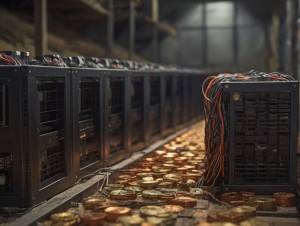The fast-growing AI adoption sets humanity up for catastrophic dangers. In a shocking turn of events, Dr. Geoffrey Hinton, widely known as the “Godfather of AI,” has resigned from his position at Google and issued a stern warning about the dangers of artificial intelligence.
AI turns out to be the greatest threat to humanity
According to reports, the “Godfather of AI” has resigned from his position at Google so that he can speak more openly about the potential risks of artificial intelligence. technology. Dr. Geoffrey Hinton worked on machine learning algorithms at Google for over a decade before leaving the company. His lifelong work on neural networks reportedly earned him the appellation.
Dr. Geoffrey’s resignation comes amid growing concerns about the use of artificial intelligence. in various industries, including healthcare, finance, and transportation. Critics argue that artificial intelligence could lead to job displacement, privacy violations, and even the development of autonomous weapons.
In the NYT today, Cade Metz implies that I left Google so that I could criticize Google. Actually, I left so that I could talk about the dangers of AI without considering how this impacts Google. Google has acted very responsibly.
— Geoffrey Hinton (@geoffreyhinton) May 1, 2023
In an interview with The New York Times, he stated that he was most concerned about the use of artificial intelligence to flood the internet with fake pictures, videos, and text to the point where people will no longer “be able to know what is true anymore.”
Hinton was also apprehensive about artificial intelligence technology replacing human labor. He believes that artificial intelligence could pose a threat to humanity in the future due to its ability to acquire unexpected behaviors from the massive amounts of data it analyzes. Hinton also expressed some regret about his life’s work:
I console myself with the normal excuse: If I hadn’t done it, somebody else would have.
Dr. Geoffrey Hinton
Dr. Geoffrey Hinton’s resignation has sent shockwaves throughout the tech industry, with many experts calling for greater oversight and regulation of artificial intelligence. As the debate over the risks and benefits of artificial intelligence continues, it is clear that the contributions of pioneers like Dr. Geoffrey Hinton will be crucial in shaping the future of this rapidly evolving technology.
Many tech experts warn about the dangers of artificial intelligence
In recent months, regulators, legislators, and tech industry leaders have all expressed concern regarding the development of artificial intelligence. Over 2,600 tech executives and researchers signed an open letter in March urging a temporary suspension to the development of artificial intelligence, citing “grave risks to society and humanity.”
In April, twelve European Union legislators signed a similar letter, and a recent EU draft bill classifies artificial intelligence tools according to their risk levels. In addition, the United Kingdom will provide $125 million to a task force for the development of “safe AI.”
Reportedly, artificial intelligence tools are already being used for disinformation, with recent examples of media outlets being duped into publishing false news. Further, one German outlet used artificial intelligence to fake an interview.
"Tasteless and misleading article." A German publisher has fired one of its magazine’s editors and apologized for publishing a fake interview with Formula One great Michael Schumacher that was generated by artificial intelligence. https://t.co/rI9RdCmlWE
— The Associated Press (@AP) April 22, 2023
Binance asserted on May 1 that its CEO Changpeng “CZ” Zhao was a member of a Chinese Communist Party student organization, which was propagated by a chatbot originating from ChatGPT, as evidenced by screenshots of the chatbot.
We respond to A LOT of stupid inquiries here, but this is really special. Thank you to @FortuneMagazine for actually digging into this. Would love for someone to figure out who is behind this.
— Patrick Hillmann (@PRHillmann) May 1, 2023
More details in 🧵 https://t.co/kDbAEjgkkV
Last week, a group of pranksters also conned multiple media outlets around the globe, including the Daily Mail and The Independent. The Daily Mail published a story about an alleged Canadian actor named “Saint Von Colucci” who was said to have died after undergoing plastic surgery to make him look more like a South Korean pop star. The Daily Mail subsequently removed the article.
What are the foreseeable dangers of AI to humanity?
There are several foreseeable dangers of artificial intelligence to humanity, some of which are already being experienced and others that may occur in the future. Here are some of the most concerning dangers:
1. Job displacement: As artificial intelligence becomes more advanced, there is a risk that it will replace human workers in many industries, leading to massive job losses and economic disruption. Elon Musk noted that there are jobs that robots will take over and perform better than humans
2. Autonomous weapons: The development of autonomous weapons, which can make decisions about who to target and when to attack without human intervention, is a major concern. These weapons could potentially lead to unintended harm, as they could malfunction or be hacked.
It's not where the real danger comes from; that's AI smarter than humans, full stop. Humanity didn't need to be given nukes, we made them from scratch.
— Eliezer Yudkowsky ⏹️ (@ESYudkowsky) April 27, 2023
I admit they're working hard on the decoy danger, and spiking any fantasies about AI *not* being directly handed weapons.
3. Unintended consequences: As artificial intelligence systems become more complex, there is a risk that they could produce unintended consequences that could be harmful. For example, an artificial intelligence. system that is designed to maximize profits for a company could inadvertently harm the environment or society.
4. Bias and discrimination: artificial intelligence systems are only as unbiased as the data they are trained on, which means that if the data used to train them is biased, the artificial intelligence system will also be biased. This can have serious consequences, particularly in areas such as criminal justice, where biased artificial intelligence systems could result in unfair treatment of certain groups.
5. Cybersecurity risks: As artificial intelligence systems become more advanced, they could also become more vulnerable to cyber-attacks. If an AI system is hacked, it could potentially be used to cause harm or disrupt critical systems.
6. Lack of transparency and accountability: If artificial intelligence systems are making important decisions about people’s lives, such as whether they are granted a loan or released on bail, it is important that these systems are transparent and accountable. However, there are concerns that some artificial intelligence systems may be opaque and difficult to understand or audit.
7. Existential risks: Some experts have raised concerns that the development of artificial intelligence could pose an existential threat to humanity, either through the development of superintelligent artificial intelligence that is beyond human control or through the use of AI in military or other destructive ways.





